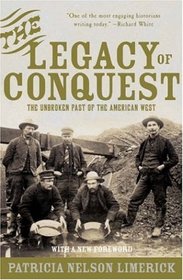Leo T. reviewed The Legacy of Conquest: The Unbroken Past of the American West on + 1775 more book reviews
Limerick's research is wonderful, although I wish she had included a bibliography with brief comments. The author offers a synthesis of late 20th C. journalism and scholarship regarding the American West with the hope that scholars will no longer dismiss the region west of the Mississippi River as they have in recent decades under the influence of Eastern historians and publishers.
The âWestern historian' has nearly vanished [I have long notices how few of us Westerners gain tenure-track academic appointments] and so Dr. Limerick gathers here the research from many disciplines. She came to realize that the well-earned esteem that Frederic Jackson Turner enjoys has left Western studies somewhat frozen in 1893 and the Frontier, while the region has long since moved on in both physical and cultural geography with no later watershed events.
This volume is in two parts: âThe Conquerorsâ and âThe Conquerors Meet Their Matchâ in which the West is views as a place and not a process (26)â of settlement and she relies on the war of âurban, social, business, labor, Chicano, Indian, and environmental historiansâ as ournalists, geographers, etc. consider everything from the petroleum industry to Latino immigration. Dr. Limerick notes that the âclosing of the frontierâ can be marked in several ways, mentioning her favorite as when Indians began catering to tourists, as did Chinatowns. [Personally, as a youth I asked older folk when did ranchers leave off carrying six guns on a daily basisâit was after WWI. That could mark the close of the frontier.]
The âWestern historian' has nearly vanished [I have long notices how few of us Westerners gain tenure-track academic appointments] and so Dr. Limerick gathers here the research from many disciplines. She came to realize that the well-earned esteem that Frederic Jackson Turner enjoys has left Western studies somewhat frozen in 1893 and the Frontier, while the region has long since moved on in both physical and cultural geography with no later watershed events.
This volume is in two parts: âThe Conquerorsâ and âThe Conquerors Meet Their Matchâ in which the West is views as a place and not a process (26)â of settlement and she relies on the war of âurban, social, business, labor, Chicano, Indian, and environmental historiansâ as ournalists, geographers, etc. consider everything from the petroleum industry to Latino immigration. Dr. Limerick notes that the âclosing of the frontierâ can be marked in several ways, mentioning her favorite as when Indians began catering to tourists, as did Chinatowns. [Personally, as a youth I asked older folk when did ranchers leave off carrying six guns on a daily basisâit was after WWI. That could mark the close of the frontier.]




